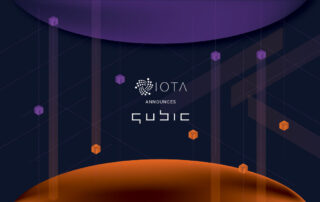IOTA tease information of ‘Project Q’ ahead of launch
Distributed ledger technology-based company [IOTA is continuing ](news/iota-trials-tangle-technology-with-smart-energy-company/)to expand its business with the release of its highly anticipated ‘Project Q’. The project has been the subject of a great deal of speculation and interest in the cryptocurrency community after the leaders of IOTA began to allude to it in a series of conversations.
The DLT Wave: From Hype to Progress
The past year has seen post-trade competitors join forces to collaborate on distributed ledger use cases and brought more rational expectations over the technology’s current capacity to achieve the scale and processing power needed for large-scale solutions. As the industry has come to the realization that blockchain’s potential isn’t limitless, and as companies focus on the nuts-and-bolts of development, applications need to demonstrate sufficient ROI and client value to get new rounds of funding.
Crypto Research Report I
Similar to the Internet, the blockchain technology is changing the way we do business. Distributed ledgers have the power to ensure the highest level of transparency and accountability in contractual agreements. Cryptocurrencies are an integral part of this newfound provenance, and first-mover investors are eagerly collecting these digital tokens backed by mathematics. However, the future of this technology is uncertain. Technological and legal risks may impede the adoption of the blockchain. On a quarterly basis, the CRR strives to provide a critical and academic perspective on the legal, technical, and economic aspects of crypto assets.
Blockchain in financial services: Regulatory landscape and future challenges for its commercial application
Distributed ledger technologies (DLTs), including blockchains, are increasingly getting a massive interest from established industries. The interest is especially strong among financial services firms, which are starting to see DLTs as a potential driver of huge savings in infrastructure and back-office processes. Besides, DLTs might become a facilitator for the development of new digital businesses leading to new sources of revenue. However, DLTs are still far from being ready for mass adoption, due to some unsolved challenges on the technological, operational, business and regulatory sides.
Distributed Ledgers,Smart Contracts,Business Standards and ISO 20022
Distributed Ledger Technology (DLT) and Smart Contracts (SC) promise to transform automation in the financial industry, and are generating huge interest amongst financial institutions and technology providers. Rapid progress is being made towards more robust implementations of the technology that might meet the needs of the financial industry for security, resilience and scalability. However, regardless of the technology, addressing automation problems in a multi-party network environment also requires business participants to define and agree the meaning and content of shared data, business processes, roles and responsibilities. This is the domain of business standards, and the focus of this paper is the application of business standards to distributed ledger technology. This paper addresses some integral questions about how DLT/SC automation can run smoothly in a multi-party network environment and highlights the importance of avoiding âreinventing the wheelâ when it comes to business definitions that facilitate interoperability. The paper recognises that full-scale standardisation of DLT/SC use cases is premature; however, SWIFT stands ready to work with the community to conduct further studies into the reuse of existing business standards in order to better facilitate the efficient workings of DLT/SC technologies for the financial industry as a whole.â
50 shades of blockchain
I’ve written about Bitcoin and blockchain for half a decade, and now banks are all talking about it too. There is a belief that the blockchain technology that came from the Bitcoin structure could revolutionise banking.


